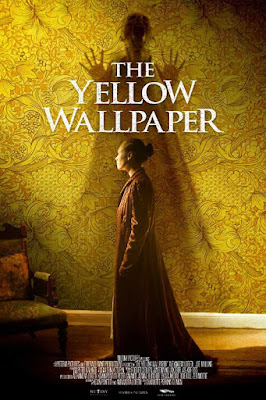Charlotte Perkins Gillman’s famous short story had fiction’s original unreliable narrator and some of the worst feng shui in the history of American literature. It was also post-horror before snobby critics fell in love with A24 Films. However, it is devilishly resistant to film adaptation, as director Kevin Pontuti and his co-adapting screenwriter and star Alexandra Loreth prove again with The Yellow Wallpaper, which releases this Tuesday on VOD.
The woman (here she is simply called Jane) is a bit moody since delivering her child, but her husband is suspiciously controlling. He also condescendingly dismisses her ailments as nerves or whatever. They have taken a summer rental, so she can supposedly recover her strength, but she finds the yellow wallpaper of her bedroom has the opposite effect.
As anyone who read Gillman’s story in their English lit class knows, the woman becomes increasingly obsessed with and unhinged by the wallpaper. She even starts to believe there is a woman creeping inside the paper. The question for readers is whether something uncanny is somehow tormenting her or is she just completely insane, but it is hard to achieve ambiguous uncertainty on film.
Indeed, even though Gillman’s story inspired a Twilight Zone episode and a handful of prior films, the definite take probably remains Agnes Moorehead’s radio performance, precisely because so much of the conflict and drama unfolds in the narrator’s head.
Nevertheless, Pontuti and company take a credible stab at it. Cinematographer Sonja Tsypin makes the yellows appropriately sickly looking, while the outside garden is idyllically lush and verdant. It is a well-crafted period production, with richly detailed, Victorian era-appropriate costumes and trappings. The film looks terrific and often sounds quite eerie thanks to some unsettling sound design, but the narrative itself feels conspicuously padded.
As a result, there are seemingly endless scenes of Jane’s eyes wildly panning her room during manic phases or her solemnly starring out into space during depressive intervals. The film just hits the same notes and narrative beats, over and over. Arguably, the Moorehead radio production followed the story just as faithfully, but in a third of the time—and without leading visuals.
Loreth goes crazy on-screen quite credibly, but her cold performance is distancing. Yet, Joe Mullins is probably even less sympathetic as her chauvinist husband John. Frankly, this is the kind of defiantly intense story that really calls for lesson in the unhinged Nic Cage school of acting.
Pontuti masterfully controls the mood, making us feel like we too are confined to Jane’s room, if that is a viewing experience you want. However, the repetitive scenes become laborious. There is a lot of good filmmaking and bad story-telling in this version of Gillman’s classic tale. It really isn’t recommended for genre fans or admirers of American short fiction, but anyone curious should watch The Yellow Wallpaper soon after it releases this Tuesday (3/29) on VOD, before Gillman is permanently cancelled for her racist ideology.

